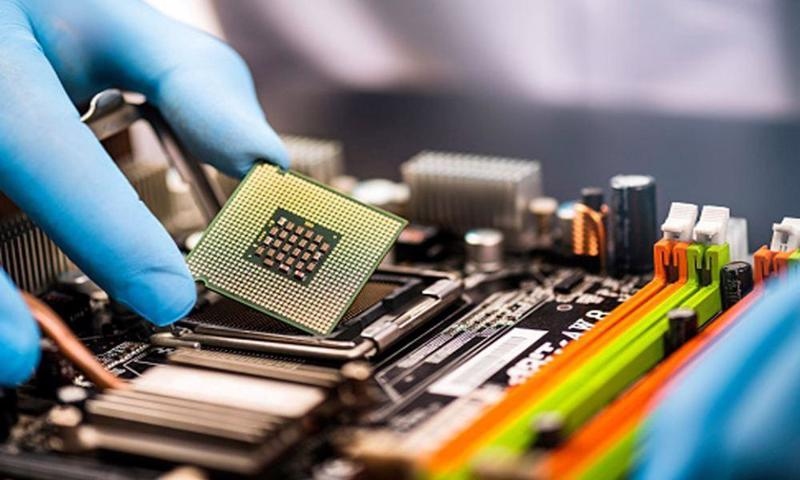
VOV.VN - The much-awaited dream of producing Made-in-Vietnam chips that has been neglected for several years, is now being awoken as the world is hunting for chips, while mastering the design stages are an important step for the country to penetrate more deeply into the global semiconductor industry.

The Ministry of Information and Communications (MIC) forecasts that the Vietnamese semiconductor industry is estimated to be valued at US$20-30 billion by 2030. But only two local firms, FPT and Viettel, are engaging in this market at the very first stage, out of a total of more than 50 eligible companies in the country. Vietnam is yet to have any manufacturing facilities, except for packaging and testing factories which have been set up by large international corporations such as Intel or Amkor.
Policymakers anticipate that the country, nestled with abundant resources for the semiconductor industry, will hold a certain position in the global semiconductor chip map, a specialised club of countries with an annual average GDP per capita of over US$11,000 which is nearly three times that of Vietnam.
In order to do that, the MIC says that Vietnam needs at least 50,000 semiconductor integrated circuit (IC) engineers by 2030, or 10 times the current number. This requires universities to increase the size of their workforce by 10 times compared to the gains they have been recorded over the past nearly 20 years. This is a challenging but feasible task, according to experts.
Minister of Education and Training Nguyen Kim Son notes that the country currently has 35 tertiary institutions offering courses related to semiconductor ICs. Next year, universities plan to enroll over 1,000 students specifically for chip designing, with about 7,000 students for related majors. These figures are estimated to increase by 20% to 30% each year.
However, Nguyen Thien Nghia, an official of the MIC, points out that, “We will miss opportunities if university engineers are trained every four years. Meanwhile, Vietnam has a contingent of 350,000 information technology and electronics engineers, and if we train them to do the job right away, this will help.”
The Government has assigned relevant ministries and sectors the task of formulating quality human resource development strategies. Since 2010, semiconductor chip products have been included on the list of national strategic products, although they have yet to receive big investments. Currently, the Ministry of Science and Technology (MoST) says it is actively implementing tasks related to research, design, and manufacturing of semiconductor chips.
Dam Bach Duong, director of the High Technology Department under the MoST, reveals that Viettel, a military run telecom giant, is currently undertaking a project on semiconductor chips, and the MoST is working on special policies for semiconductor chip manufacturing alongside the telecom giant.
“This is a very special industry, and it therefore requires special policies to develop it,” says Duong.
Currently, development policies for this industry are inconsistent, meaning that the Government has assigned relevant ministries and sectors to introduce synchronous and specific policies in a bid to best support businesses, organisations, and individuals in research, manufacturing, development, and production of chips.
However, 20 years is not a long time for Vietnam to gain a foothold in a high-tech industry which requires absolute precision when it comes to semiconductor chips. But experts say that such time is long enough for the country to make necessary preparations for the semiconductor industry to take shape.
The world is hunting for chips, and in order to solve this problem, global semiconductor technology leaders such as the US and Japan are keen to support Vietnam in entering this market. This is also the country’s future direction.
The Government aims to promote digital transformation in all fields, meaning that the demand for electronic devices and Internet of things (IoT) - connected devices will be huge. If the state places orders directly or creates technical barriers, giving priority to domestic products, then Vietnamese engineers themselves are capable of designing and manufacturing chips for telecommunications products, say experts.
VOV.VN - The semiconductor industry is expected to open up opportunities for Vietnamese businesses to step into the most modern and fundamental playground in the digital transformation process.
VOV.VN - Many significant financiers from developed countries are ready to invest in the country's semiconductor chip manufacturing, according to the Ministry of Science and Technology.
VOV.VN - Prime Minister Pham Minh Chinh and senior Vietnamese officials attended a panel discussion with global businesses in Davos, Switzerland, on January 16, examining ways to develop artificial intelligence (AI), automobile technology, semiconductor chips and ecosystems in Vietnam.
Bình luận
Bình luận của bạn sẽ được xét duyệt trước khi đăng